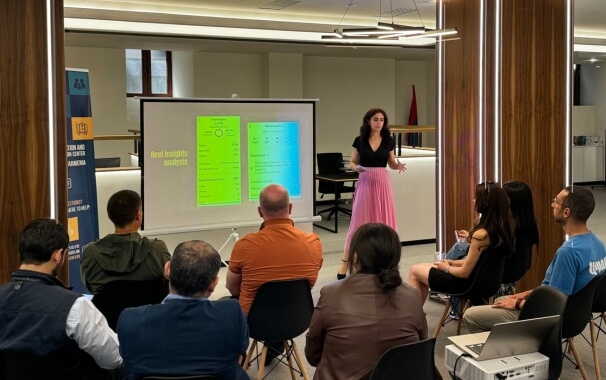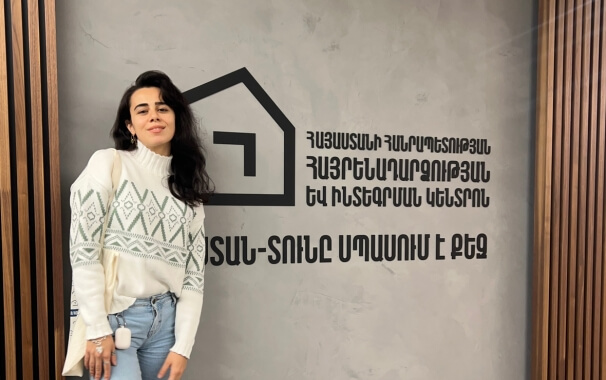My Way Home
03.09.2024
Repat Story
System Of a Down and the iGorts Program: How to Want to Move Back to the Homeland
-webp(85)-o(jpg).webp?token=7691728aae5d0ede6f39e1e14539f8ff)
System Of a Down and an Awakening
It’s unlikely this article will ever be read by any of the members of System of a Down, but we’d like to share the story of how one song by these ethnic Armenian musicians changed the life of a young woman living in Moscow.
Marina Sarkisian remembers hearing ‘Aerials’ by System Of a Down and feeling something familiar in it, especially the polyphonic vocal part. “I felt like I had heard that somewhere before, so I looked them up and found out they were Armenians, true patriots of their homeland. Since that day, I began to open up to my Armenian identity in a new way, learning about Armenian culture and diving deeper into our history. I watched a lot of films, including modern ones, to understand life in Armenia today, and I read about our rich history. It was an eye-opening experience that came out of nowhere,” emphasizes Marina.
Marina Sarkisian remembers hearing ‘Aerials’ by System Of a Down and feeling something familiar in it, especially the polyphonic vocal part. “I felt like I had heard that somewhere before, so I looked them up and found out they were Armenians, true patriots of their homeland. Since that day, I began to open up to my Armenian identity in a new way, learning about Armenian culture and diving deeper into our history. I watched a lot of films, including modern ones, to understand life in Armenia today, and I read about our rich history. It was an eye-opening experience that came out of nowhere,” emphasizes Marina.
Marina was born in Moscow, and it’s now been a year since she moved to her motherland, Armenia.
Until she was fifteen, Marina hadn’t really awakened to her Armenian identity. Although her family only spoke Armenian at home, which gave her strong language skills, questions of ethnic identity didn’t come up in a big city like Moscow.
After discovering System Of a Down and deepening her connection to Armenia, Marina began thinking about moving there one day. “Since 2020, I have been thinking about moving to Armenia, but finding work was the biggest challenge. I visited often, sometimes four to five times a year, and every time I left, it hurt. I felt like a bird in a cage, waiting to be released back into life. I finally decided to repatriate when I received a job offer through the iGorts program. I think I would have moved eventually, but I’m not sure I could have managed without that job offer,” Marina reflects.

A New Profession Through iGorts
The iGorts program is a government initiative that enables diaspora Armenian professionals to work in Armenia’s public sector. Each year, it brings around 50 specialists from various countries to work in Armenia for one year. To join, participants must prove their professional background, sign a contract, and work according to their skills.
Marina worked in the Repatriation and Integration Center of the Office of the High Commissioner for Diaspora Affairs. “At the Center, we help Armenians with questions about repatriation, including citizenship, passports, moving personal belongings, driver’s licenses, and military service. I was responsible for public relations, establishing partnerships, managing social media, organizing educational courses, and providing consultations for repatriates,” she explains.
Marina holds a Bachelor’s degree in Finance and is now studying for a Master’s in Psychology at RAU, focusing her thesis on the ethnopsychology of Armenian youth in the diaspora. “I plan to conduct interviews with Armenian youth from various countries. Each diaspora has its own unique qualities, and I want to learn more about them to help with engagement since diaspora Armenians are potential repatriates. I want to find a ‘key’ to their hearts,” she says.

Changes in Life, Thoughts on the Diaspora
Reflecting on how life in Armenia has changed her, Marina mentions her “coffee rule.” Although she didn’t drink coffee before, she not only enjoys it now but often offers it during gatherings, knowing that many conversations and issues can be resolved over coffee. After Moscow’s coldness, she is glad to be part of a warm Armenian community, which is new to her.
Marina suggests a thoughtful approach when asked what she would tell Armenians abroad about repatriation: “Repatriation shouldn’t feel like a ‘must’—it should be each person’s choice. I usually tell people that if they’re not ready to move, they should continue contributing to Armenian communities in the diaspora, which is very important. No matter how many people return to Armenia, the diaspora will always exist. You should really be honest with yourself when making this decision and listen to your feelings,” Marina concludes.
Living in Armenia, she continues to run her Telegram channel, Armenian Diaspora Calendar, which she created in 2018 while in Moscow, sharing information on cultural and educational events in both the diaspora and Armenia.
By Nare Bejanyan
-
Repat Story
-webp(85)-o(jpg).webp?token=acf3385fd392b9017b0b4eeec09bda38) 28.10.2024Happy Back Home: Opera Singer Suren Mkyan's Repatriation to Armenia
28.10.2024Happy Back Home: Opera Singer Suren Mkyan's Repatriation to Armenia

-webp(85)-o(jpg).webp?token=1b657244ba7067d9e8e31e9012e4f0e3)
-webp(85)-o(jpg).webp?token=660f4d541ccd8aef0cd922bfd09dd6bc)
-webp(85)-o(jpg).webp?token=11a5bd6b8d18f0ff2421ee4996d6edd4)